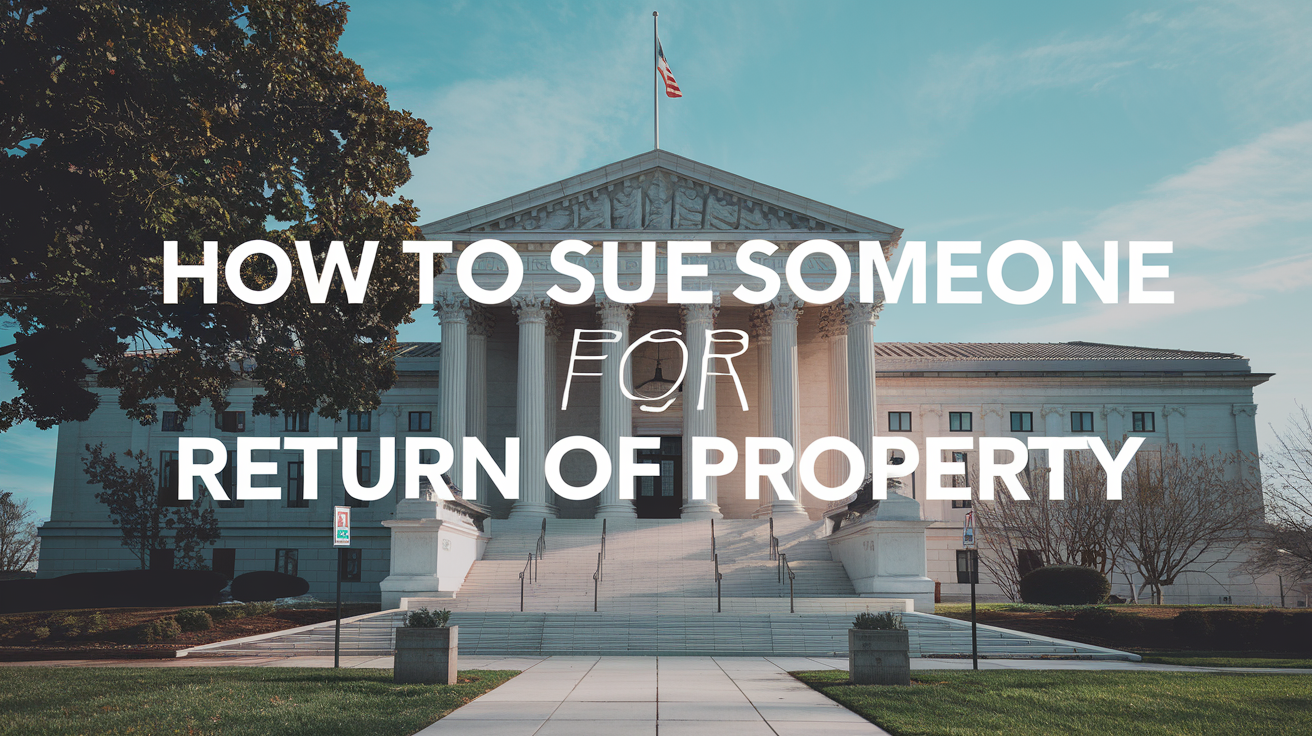
- Tajinder Kaur Sivia
- 26-Nov-2024
There may be a time in your life when you will have to reclaim something that is rightfully yours but is in the hands of another person. If you have tried and failed to get it back, then you might be asking yourself how to file a case to reclaim the property. In this guide, you’ll learn everything there is to know about how the law works when it comes to getting your possessions back.
Understanding Your Options
When someone refuses to return your property, you typically have two legal avenues to pursue: a civil action or a small claims court action. Therefore, defining what way should be taken next depends on the value of property in question and the relevant laws in the jurisdiction. It is now time to unwrap the process and important considerations.
Step 1: Establish Ownership of the Property
Before applying to court it will be important to be in a position to demonstrate that you own the property. This proof is very important because without it the court cannot grant a return of the property to you. Here are some ways to prove ownership:
- Original receipt of the item to prove that you bought it, invoice if you are still paying.
- A photo or a video of the property in your possession at the time of the transaction.
- Source statements from individuals who have seen you owning the property.
- Documents that show agreements to ownership such as contracts, agreements.
Once you gather this evidence, you’ll have a stronger case to sue someone for return of property.
Also Read: - Can i transfer property to a family member
Step 2: Attempt to Resolve the Issue Outside of Court
Going to court can be time consuming and expensive so people try to seek their remedies outside the legal frameworks where possible. Here’s how:
- Communicate Clearly
Try contacting the person to whom you have handed over your property. First of all, it is necessary to be polite but to be rather tough and let them understand that you really would like to get the property back.
- Send a Demand Letter
If verbal communication doesn’t work, try sending a formal demand letter. This document should outline:
- A description of the property.
- Proof of ownership.
- A clear request for the return of the item.
- A deadline for when you expect the property to be returned.
- A warning that you will sue if the property is not returned by the deadline.
A demand letter demonstrates your willingness to take legal action if necessary, and sometimes, this is all it takes to resolve the issue.
Also Read: - How to Invoke Power of Attorney in Ontario
Step 3: Decide on the Type of Lawsuit
If the other party still refuses to return your property, it’s time to consider suing them. There are different types of legal actions you might take when suing someone for return of property:
- Replevin (or Claim and Delivery)
This is the most common action used for the return of personal property. In a replevin action, you are asking the court to order the defendant to return your property to you. Replevin lawsuits are typically used when the property has special or sentimental value and cannot easily be replaced by monetary compensation.
- Conversion
Conversion is a lawsuit for damages based on the wrongful possession of your property. In this case, if the property cannot be returned for any reason, you might be awarded the monetary value of the item instead.
- Small Claims Court
f the property’s value is below a certain threshold (this varies by jurisdiction), you may be able to file in small claims court. Small claims court is generally less formal, quicker, and less expensive than filing a full civil lawsuit.
Step 4: File the Lawsuit
- File a Complaint
The first document you’ll file is called a complaint, which details your legal argument. It should include:
- A description of the property.
- Evidence of your ownership.
- Details of your efforts to recover the property.
- The legal grounds on which you are suing for its return.
Serve the Defendant
After filing the complaint, you must legally notify the defendant of the lawsuit. This process is known as “serving” the defendant. Each state has specific rules for serving someone with a lawsuit, so ensure you’re following the proper guidelines.
Prepare for Court
Gather all evidence, including any documents, receipts, photos, or witness statements. You’ll want to have everything organized and ready to present to the court.
Attend the Hearing
In court, both you and the defendant will have the chance to present your arguments. Be prepared to answer questions from both the judge and the defendant's attorney.
Step 5: Understand the Possible Outcomes
When you sue someone for return of property, there are a few possible outcomes:
- Return of Property
In the case you bring and win the case, you maybe awarded by the court to have back your property from the defendant. If they decline, other legally related repercussions may be imposed on them.
- Monetary Compensation
In case the property cannot be returned, you may be compensated by other damages that are of equivalent value to the lost item. This is experienced most in conversion cases where the property in question was lost or destroyed, sold or transferred.
- No Recovery
In other words, even if the court ruled against you, you would not get your property back or be paid damages. This could happen if the court finds insufficient evidence of ownership or believes the other party has a legal claim to the property.
Also Read: - Compensation for tenants when landlord sells property
FAQs
Q. Can I sue someone for return of property without a lawyer?
A. Yes, especially if your case is straightforward or if you’re going to small claims court. Small claims court is designed to be user-friendly and typically doesn’t require legal representation. However, if your case involves valuable or complex property, consulting a lawyer is advisable.
Q. How long does it take to resolve a lawsuit for the return of property?
A. The duration of a lawsuit depends on factors like the court’s schedule, the complexity of your case, and whether the other party contests it. Small claims cases are typically resolved faster, sometimes within a few months, while full civil cases may take longer.
Final Thoughts
Learning how to sue someone for return of property can be an empowering process when you’ve exhausted all other options. By preparing thoroughly, documenting ownership, and understanding the legal procedures, you can confidently pursue the return of your belongings. Remember, suing someone for return of property is not just about recovering what’s rightfully yours; it’s about standing up for your rights and ensuring justice is served.
If you are involved in complicated high stakes deals pertaining to the real estates then, having a reliable legal counsel becomes a true blessing. HouseClosing.ca provides legal aid to people from Ontario with a focus on real estate operations, purchase and sale of houses, mortgage, title transfer, etc. Their professional services are supported by a dedicated team, who take pride in their operations particularly when ensuring that all your legal requirements are well handled.


